关于英语中“给人添麻烦”的说法
英语表达道歉与感谢地句子
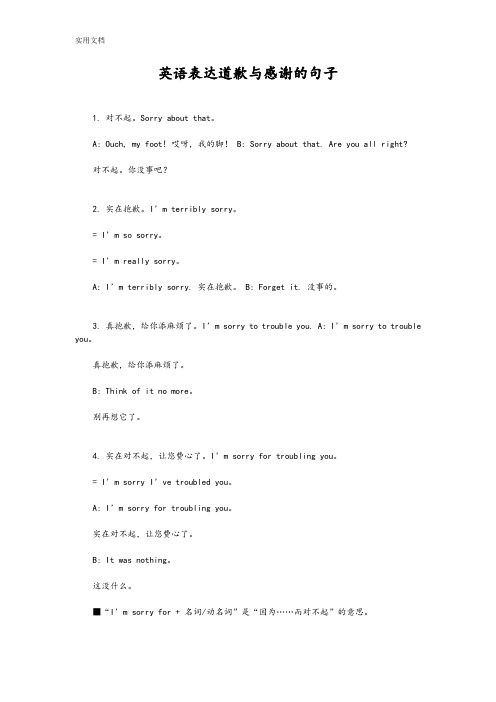
英语表达道歉与感谢的句子1. 对不起。
Sorry about that。
A: Ouch, my foot! 哎呀,我的脚! B: Sorry about that. Are you all right?对不起。
你没事吧?2. 实在抱歉。
I’m terribly sorry。
= I’m so sorry。
= I’m really sorry。
A: I’m terribly sorry. 实在抱歉。
B: Forget it. 没事的。
3. 真抱歉,给你添麻烦了。
I’m sorry to trouble you. A: I’m sorry to trouble you。
真抱歉,给你添麻烦了。
B: Think of it no more。
别再想它了。
4. 实在对不起,让您费心了。
I’m sorry for troubling you。
= I’m sorry I’ve troubled you。
A: I’m sorry for troubling you。
实在对不起,让您费心了。
B: It was nothing。
这没什么。
■“I’m sorry for + 名词/动名词”是“因为……而对不起”的意思。
5. 请原谅我。
I beg your pardon。
A: I beg your pardon。
请原谅我。
B: Write it off。
这事一笔勾销吧。
● write off“注销,取消”6. 我真蠢。
That was stupid of me. A: Did you bring my novel?把我的小说带来了吗?B: Oh, I forgot again. That was stupid of me。
哎呀,我又忘记了。
我真蠢。
■这一句是自责时的用语,类似的说法还有“Silly me。
”。
7. 对不起,让你久等了。
I’m sorry I’ve kept you waiting. ○ I’m sorry for keeping you waiting。
trouble 中文翻译

trouble 中文翻译
trouble 中文翻译是“麻烦,苦恼,困难”。
与一般的英语单词相比,trouble有更多的意思。
首先,trouble常作为名词使用,意思是“烦恼,困难,麻烦”。
这个词在英语中可以指“负面的情况”,也可以表示“困难或麻烦的事情”。
例如:We have been having a lot of trouble with the new system.(我们在新系统上遇到了很多麻烦。
)另外,trouble也可以表示“生病”,表达方式为“have trouble with sth”,如:He has been having trouble with his stomach.(他的胃一直不舒服。
)
此外,trouble也可以作为动词使用,意思是“使…麻烦”。
它表示“对某人或某事造成麻烦”。
例如:Please don't trouble yourself about it.(请不要为此麻烦你自己。
)
最后,trouble也可以表示“尽力去做某事”,意思是“做某事太困难,花费太多时间”。
例如:I wouldn't trouble to do that.(我不会费劲去做那件事。
)总之,trouble 是一个普通词,用来表达“烦恼,困难,麻烦”。
它可以用作名词,动词或副词,用来描述“不好的情况”,或者表达“做某事太困难”的意思。
trouble中文翻译
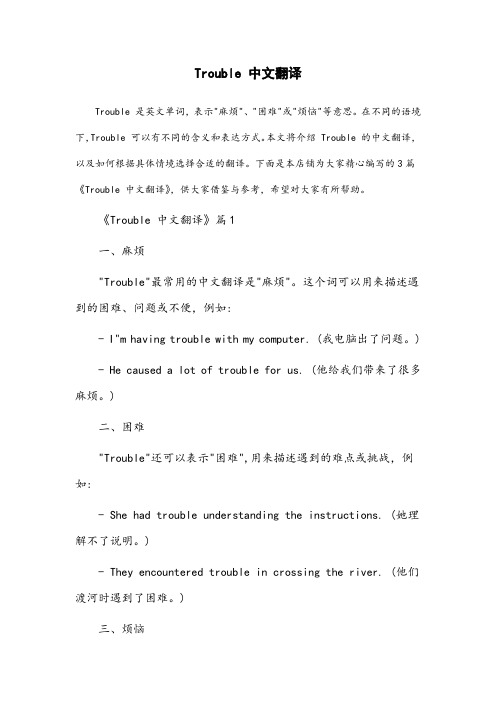
Trouble 中文翻译Trouble 是英文单词,表示"麻烦"、"困难"或"烦恼"等意思。
在不同的语境下,Trouble 可以有不同的含义和表达方式。
本文将介绍 Trouble 的中文翻译,以及如何根据具体情境选择合适的翻译。
下面是本店铺为大家精心编写的3篇《Trouble 中文翻译》,供大家借鉴与参考,希望对大家有所帮助。
《Trouble 中文翻译》篇1一、麻烦"Trouble"最常用的中文翻译是"麻烦"。
这个词可以用来描述遇到的困难、问题或不便,例如:- I"m having trouble with my computer. (我电脑出了问题。
) - He caused a lot of trouble for us. (他给我们带来了很多麻烦。
)二、困难"Trouble"还可以表示"困难",用来描述遇到的难点或挑战,例如:- She had trouble understanding the instructions. (她理解不了说明。
)- They encountered trouble in crossing the river. (他们渡河时遇到了困难。
)三、烦恼"Trouble"还可以表示"烦恼"或"困扰",用来描述让人感到不安或痛苦的事情,例如:- He"s been having trouble sleeping. (他最近睡眠不好。
) - She has a lot of trouble with her in-laws. (她与公婆关系很不好。
)四、其他翻译除了以上三种翻译,"trouble"还可以根据具体语境翻译成其他词语,例如:- Trouble is brewing. (麻烦正在酝酿。
英语口语 安慰他人常用的英语表达
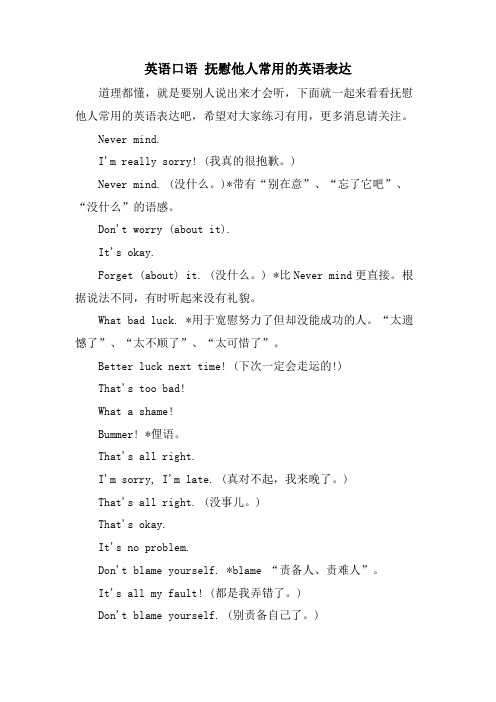
英语口语抚慰他人常用的英语表达道理都懂,就是要别人说出来才会听,下面就一起来看看抚慰他人常用的英语表达吧,希望对大家练习有用,更多消息请关注。
Never mind.I'm really sorry! (我真的很抱歉。
)Never mind. (没什么。
)*带有“别在意”、“忘了它吧”、“没什么”的语感。
Don't worry (about it).It's okay.Forget (about) it. (没什么。
) *比Never mind更直接。
根据说法不同,有时听起来没有礼貌。
What bad luck. *用于宽慰努力了但却没能成功的人。
“太遗憾了”、“太不顺了”、“太可惜了”。
Better luck next time! (下次一定会走运的!)That's too bad!What a shame!Bummer! *俚语。
That's all right.I'm sorry, I'm late. (真对不起,我来晚了。
)That's all right. (没事儿。
)That's okay.It's no problem.Don't blame yourself. *blame “责备人、责难人”。
It's all my fault! (都是我弄错了。
)Don't blame yourself. (别责备自己了。
)这不是你的错。
It's not your fault.It happens. *发生了没有预料到的事情,劝人想开点儿的语气。
I feel really bad about it. (那件事我做的真不好。
)Don't worry, it happens. (别担忧了,那是常有的事。
)It happens to the rest of us.It happens to everyone.There's no need to worry about it.Don't concern yourself.Don't give it another thought.*give it another thought 直译是“别再有其他的想法”,“别想得太多”。
惹麻烦的英文短语
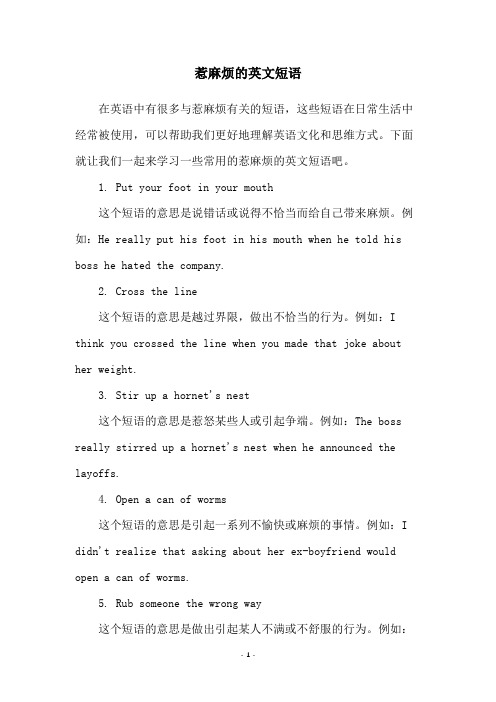
惹麻烦的英文短语在英语中有很多与惹麻烦有关的短语,这些短语在日常生活中经常被使用,可以帮助我们更好地理解英语文化和思维方式。
下面就让我们一起来学习一些常用的惹麻烦的英文短语吧。
1. Put your foot in your mouth这个短语的意思是说错话或说得不恰当而给自己带来麻烦。
例如:He really put his foot in his mouth when he told his boss he hated the company.2. Cross the line这个短语的意思是越过界限,做出不恰当的行为。
例如:I think you crossed the line when you made that joke about her weight.3. Stir up a hornet's nest这个短语的意思是惹怒某些人或引起争端。
例如:The boss really stirred up a hornet's nest when he announced the layoffs.4. Open a can of worms这个短语的意思是引起一系列不愉快或麻烦的事情。
例如:I didn't realize that asking about her ex-boyfriend would open a can of worms.5. Rub someone the wrong way这个短语的意思是做出引起某人不满或不舒服的行为。
例如:His arrogance really rubs me the wrong way.6. Get on someone's nerves这个短语的意思是让某人感到恼怒或不耐烦。
例如:Her constant complaining really gets on my nerves.7. Push someone's buttons这个短语的意思是故意惹恼某人或引起某人的情绪。
英语词汇用法-含有bother的10个重要搭配
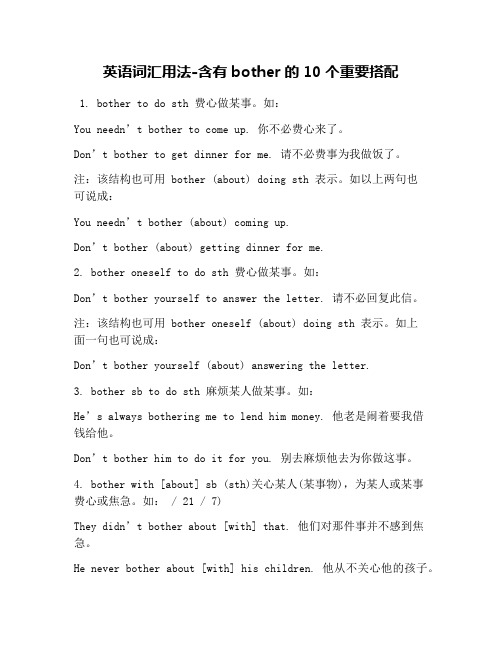
英语词汇用法-含有bother的10个重要搭配1. bother to do sth 费心做某事。
如:You needn’t bother to come up. 你不必费心来了。
Don’t bother to get dinner for me. 请不必费事为我做饭了。
注:该结构也可用 bother (about) doing sth 表示。
如以上两句也可说成:You needn’t bother (about) coming up.Don’t bother (about) getting dinner for me.2. bother oneself to do sth 费心做某事。
如:Don’t bother yourself to answer the letter. 请不必回复此信。
注:该结构也可用 bother oneself (about) doing sth 表示。
如上面一句也可说成:Don’t bother yourself (about) answering the letter.3. bother sb to do sth 麻烦某人做某事。
如:He’s alw ays bothering me to lend him money. 他老是闹着要我借钱给他。
Don’t bother him to do it for you. 别去麻烦他去为你做这事。
4. bother with [about] sb (sth)关心某人(某事物),为某人或某事费心或焦急。
如: / 21 / 7)They didn’t bother about [with] that. 他们对那件事并不感到焦急。
He never bother about [with] his children. 他从不关心他的孩子。
5. bother sb with [about] sth 用某事麻烦某人。
如:Don’t bother him with [about] it now; he’s very busy. 现在不要拿这个去打扰他,他很忙。
英语表达道歉与感谢的句子
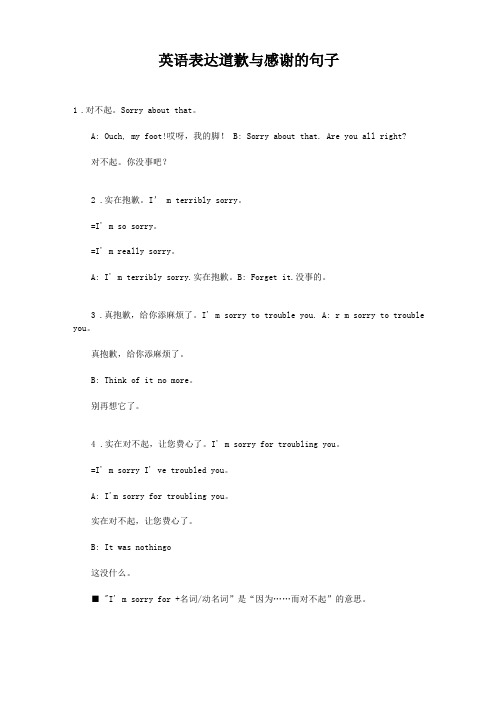
英语表达道歉与感谢的句子1.对不起。
Sorry about that。
A:Ouch, my foot!哎呀,我的脚! B: Sorry about that. Are you all right?对不起。
你没事吧?2.实在抱歉。
I’ m terribly sorry。
=I' m so sorry。
=I' m really sorry。
A: I' m terribly sorry.实在抱歉。
B: Forget it.没事的。
3.真抱歉,给你添麻烦了。
I' m sorry to trouble you. A: r m sorry to trouble you。
真抱歉,给你添麻烦了。
B:Think of it no more。
别再想它了。
4.实在对不起,让您费心了。
I' m sorry for troubling you。
=I' m sorry I' ve troubled you。
A:I'm sorry for troubling you。
实在对不起,让您费心了。
B:It was nothingo这没什么。
■ "I' m sorry for +名词/动名词”是“因为……而对不起”的意思。
5.请原谅我。
I beg your pardon。
A:I beg your pardon。
请原谅我。
B:Write it off。
这事一笔勾销吧。
• write off ”注销,取消”6.我真蠢。
That was stupid of me. A: Did you bring my novel?把我的小说带来了吗?B: Oh, I forgot again. That was stupid of me。
哎呀,我又忘记了。
我真蠢。
■这一句是自责时的用语,类似的说法还有“Silly me。
"。
7. 对不起,让你久等了。
I ’ m sorry I ' ve kept you waiting. O I ' m sorry for keeping you waiting。
英语中的礼貌用语

礼貌用语是人们在日常工作和生活交往中的一个重要部分。
它反映一个国家的文明程度和人民的文化素质。
本文将介绍一些英语礼貌用语:要求别人做某事时,通常使用下列的客气句型:Would you please ……? Would you like to ……? I wonder if you would …… Would you mind (doing)……? Would you be so kind as to ……? I would be most grateful if you……等等。
使用这些客气的表达方式,更易使对方接受。
如:1.导游要求游客跟着他走的时候说,Would you please follow me and go this way? (请大家跟我这边走好吗?)2.宴会主人安排座位时说,Mr. XXX, would you like to sit beside Ms XXX, please? (XXX 先生,请你在XXX女士旁边就座好吗?)3.主考人对参加面试的求职者可以用以下方式提问,Would you mind answering a few personal questions? (请你回答几个有关个人方面的问题,好吗?)4.请人顺便为你做些事时说,I wonder if you could do me a favour by post this letter in the post office nearby on your way home. (劳驾你是否可在回家途中到附近邮局为我寄封信。
)5.请客户尽早告诉对新产品意见时说:“As a courtesy to the next passenger, may we suggest that you clean the basin with the towel you have been using. (为照顾其他顾客,我们竭诚建议你用清洁纸把刚使用过的脸盆擦干净。
停车场英语常用口语
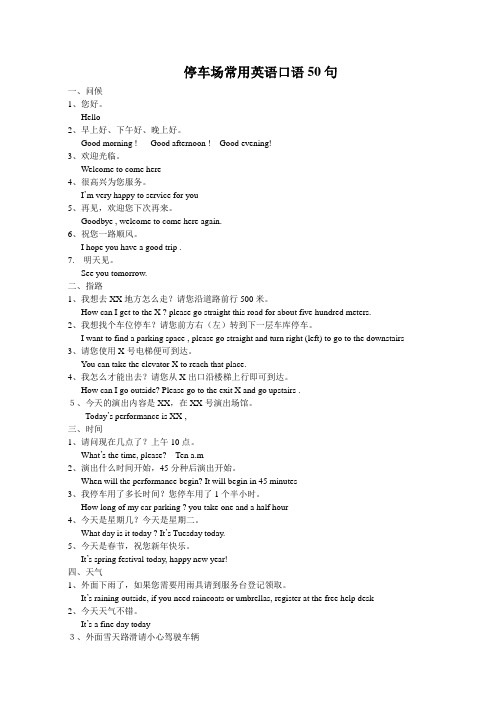
停车场常用英语口语50句一、问候1、您好。
Hello2、早上好、下午好、晚上好。
Good morning ! Good afternoon ! Good evening!3、欢迎光临。
Welcome to come here4、很高兴为您服务。
I’m very happy to service for you5、再见,欢迎您下次再来。
Goodbye , welcome to come here again.6、祝您一路顺风。
I hope you have a good trip .7. 明天见。
See you tomorrow.二、指路1、我想去XX地方怎么走?请您沿道路前行500米。
How can I get to the X ? please go straight this road for about five hundred meters.2、我想找个车位停车?请您前方右(左)转到下一层车库停车。
I want to find a parking space , please go straight and turn right (left) to go to the downstairs3、请您使用X号电梯便可到达。
You can take the elevator X to reach that place.4、我怎么才能出去?请您从X出口沿楼梯上行即可到达。
How can I go outside? Please go to the exit X and go upstairs .5、今天的演出内容是XX,在XX号演出场馆。
Today’s performance is XX ,三、时间1、请问现在几点了?上午10点。
What’s the time, please? Ten a.m2、演出什么时间开始,45分种后演出开始。
When will the performance begin? It will begin in 45 minutes3、我停车用了多长时间?您停车用了1个半小时。
服务人员英语礼貌用语30句

服务人员英语礼貌用语30 句1.早晨好。
中午好。
晚上好。
Good morning/afternoon/evening.2.欢迎您光临我们饭店。
Welcome to our Hotel.3.旅游愉快吗?Did you have a nice trip?4.我是接待员/服务员。
I am receptionist. (waiter / waitress).5.需要我帮忙吗?What can l do for yon?6.请稍等一会儿。
Just a moment, please.7.很高兴为您服务。
I am always at your service8希望您在这里住得愉快。
9.对不起,给您添麻烦。
10.如果您需要什么帮助,请及时告诉我。
Just let me know if there is anything. I can do for you .11.这边请。
12.请走这边。
Would you care to step this way , please?13.不客气。
You are welcome /“ Notat all/ It “s my pleasure.14.为宾客服务是我们的荣幸。
It “s our pleasure to serve our guests15.您先请。
请跟我来。
After you . Follow me ,please.16.对不起,我马上就过来。
Excuse me, I will be with you in a minute..17.能告诉我您的姓名吗?May l have your name?18.对不起,止您久等了;Sorry to have kept your waiting.19.您能填一下这张表吗?Would you please fill in this form?20.您如何付账,是现金还是信用卡?How are you going to pay , in cash or by credit card?21.对不起,我能进来吗?Excuse me, may l come in?22.一直往前走。
trouble的用法总结
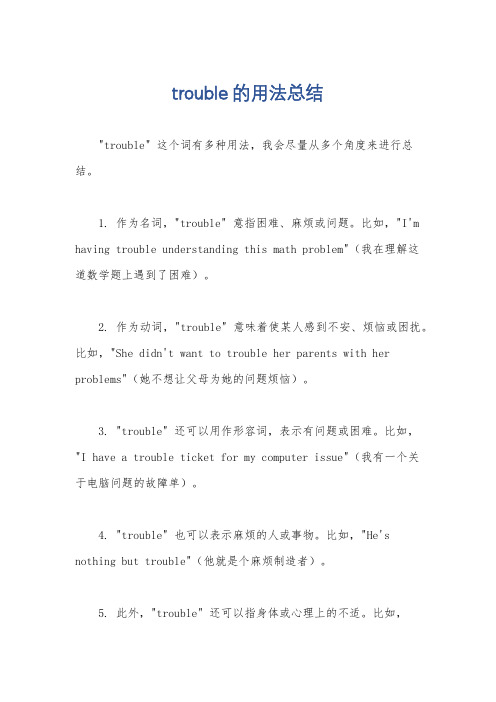
trouble的用法总结"trouble" 这个词有多种用法,我会尽量从多个角度来进行总结。
1. 作为名词,"trouble" 意指困难、麻烦或问题。
比如,"I'm having trouble understanding this math problem"(我在理解这道数学题上遇到了困难)。
2. 作为动词,"trouble" 意味着使某人感到不安、烦恼或困扰。
比如,"She didn't want to trouble her parents with her problems"(她不想让父母为她的问题烦恼)。
3. "trouble" 还可以用作形容词,表示有问题或困难。
比如,"I have a trouble ticket for my computer issue"(我有一个关于电脑问题的故障单)。
4. "trouble" 也可以表示麻烦的人或事物。
比如,"He's nothing but trouble"(他就是个麻烦制造者)。
5. 此外,"trouble" 还可以指身体或心理上的不适。
比如,"She's been having trouble with her back lately"(她最近背部不舒服)。
总的来说,"trouble" 这个词可以用作名词、动词和形容词,常常用来描述问题、困难、不安或烦恼。
希望这些总结能够帮助你更好地理解这个词的用法。
给您添麻烦了800字英语作文
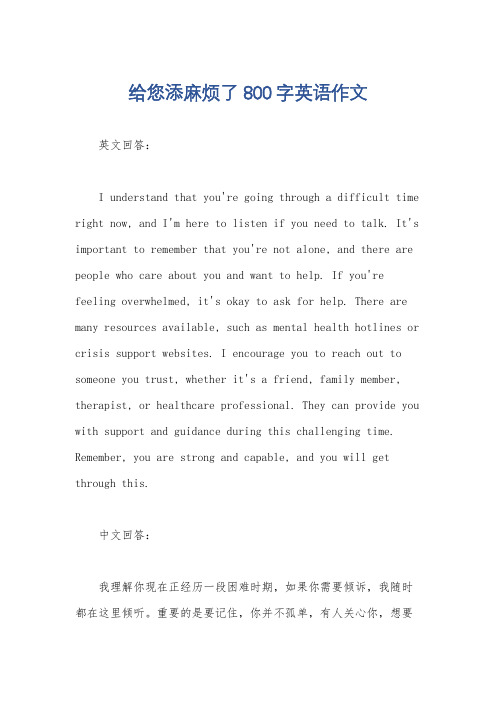
给您添麻烦了800字英语作文英文回答:I understand that you're going through a difficult time right now, and I'm here to listen if you need to talk. It's important to remember that you're not alone, and there are people who care about you and want to help. If you're feeling overwhelmed, it's okay to ask for help. There are many resources available, such as mental health hotlines or crisis support websites. I encourage you to reach out to someone you trust, whether it's a friend, family member, therapist, or healthcare professional. They can provide you with support and guidance during this challenging time. Remember, you are strong and capable, and you will get through this.中文回答:我理解你现在正经历一段困难时期,如果你需要倾诉,我随时都在这里倾听。
重要的是要记住,你并不孤单,有人关心你,想要帮助你。
如果你感到不知所措,寻求帮助是可以的。
有许多资源可用,例如心理健康热线或危机支持网站。
我鼓励你向你信任的人寻求帮助,无论是朋友、家人、治疗师还是医疗保健专业人员。
给某人带来难题英语短语
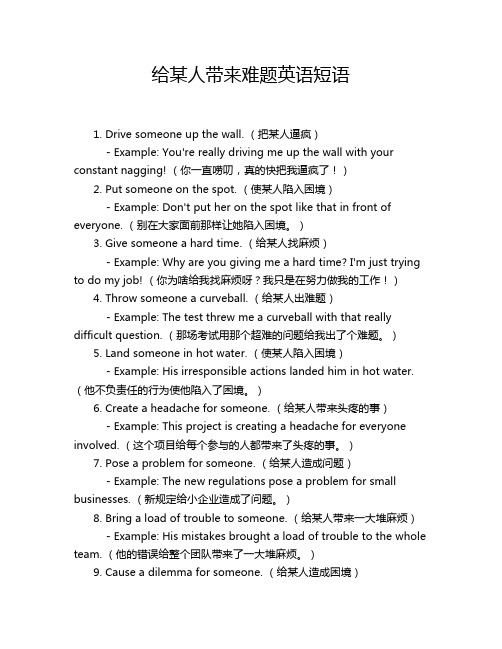
给某人带来难题英语短语1. Drive someone up the wall. (把某人逼疯)- Example: You're really driving me up the wall with your constant nagging! (你一直唠叨,真的快把我逼疯了!)2. Put someone on the spot. (使某人陷入困境)- Example: Don't put her on the spot like that in front of everyone. (别在大家面前那样让她陷入困境。
)3. Give someone a hard time. (给某人找麻烦)- Example: Why are you giving me a hard time? I'm just trying to do my job! (你为啥给我找麻烦呀?我只是在努力做我的工作!)4. Throw someone a curveball. (给某人出难题)- Example: The test threw me a curveball with that really difficult question. (那场考试用那个超难的问题给我出了个难题。
)5. Land someone in hot water. (使某人陷入困境)- Example: His irresponsible actions landed him in hot water. (他不负责任的行为使他陷入了困境。
)6. Create a headache for someone. (给某人带来头疼的事)- Example: This project is creating a headache for everyone involved. (这个项目给每个参与的人都带来了头疼的事。
)7. Pose a problem for someone. (给某人造成问题)- Example: The new regulations pose a problem for small businesses. (新规定给小企业造成了问题。
“麻烦”bother“二、三、四”

“麻烦”bother“二、三、四”作者:许光辉来源:《新高考·高二英语》2012年第04期动词bother看似简单,但是在具体的语境里却有着不同意思。
我们先来欣赏几句英文电影台词:1. Mrs. Gump: Forrest! I told you not to bother this nice young man.—Forrest Gump2. Scarlet: Oh bother the war...was there, was there anyone else there?—Gone with the Wind3. The more you learn, the more you know. The more you know, the more you forget. The more you forget, the less you know. So why bother to learn?—Garfield上面三段台词的意思分别是:1. Forrest,叫你不要打扰这位叔叔。
2. 讨厌的战争,还有其他人吗?3. 学的越多,知道的越多;知道的越多,忘记的越多;忘记的越多,知道的越少,为什么学来着?也许有的同学会感到非常纳闷,bother究竟何时理解为“麻烦”,何时理解为“费心”呢?其实我们只要从下面三个方面就可以彻底掌握该词的用法了。
二——两种词性bother主要有两个词性,即动词与名词。
我们先看bother作动词的用法:1. 表示“打扰,麻烦”,为及物动词,要表示用某事麻烦某人,一般用介词 with 或 about引出事由。
例如:I’m sorry that I have to bother you with / about this problem. 对不起,我要用这个问题来麻烦你了。
2. 表示“费心,费力”,多用于否定句和疑问句;若表示费心做某事,其后接动词时,通常用动词不定式。
trouble用法
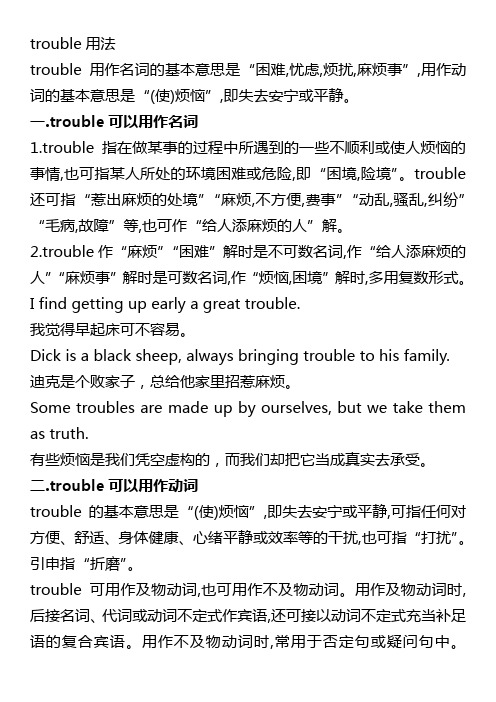
trouble用法trouble用作名词的基本意思是“困难,忧虑,烦扰,麻烦事”,用作动词的基本意思是“(使)烦恼”,即失去安宁或平静。
一.trouble可以用作名词1.trouble指在做某事的过程中所遇到的一些不顺利或使人烦恼的事情,也可指某人所处的环境困难或危险,即“困境,险境”。
trouble 还可指“惹出麻烦的处境”“麻烦,不方便,费事”“动乱,骚乱,纠纷”“毛病,故障”等,也可作“给人添麻烦的人”解。
2.trouble作“麻烦”“困难”解时是不可数名词,作“给人添麻烦的人”“麻烦事”解时是可数名词,作“烦恼,困境”解时,多用复数形式。
I find getting up early a great trouble.我觉得早起床可不容易。
Dick is a black sheep, always bringing trouble to his family. 迪克是个败家子,总给他家里招惹麻烦。
Some troubles are made up by ourselves, but we take them as truth.有些烦恼是我们凭空虚构的,而我们却把它当成真实去承受。
二.trouble可以用作动词trouble的基本意思是“(使)烦恼”,即失去安宁或平静,可指任何对方便、舒适、身体健康、心绪平静或效率等的干扰,也可指“打扰”。
引申指“折磨”。
trouble可用作及物动词,也可用作不及物动词。
用作及物动词时,后接名词、代词或动词不定式作宾语,还可接以动词不定式充当补足语的复合宾语。
用作不及物动词时,常用于否定句或疑问句中。
trouble接复合宾语时不用于被动结构。
Could I trouble you to open the window? 麻烦你把窗子打开好吗?May I trouble you to move your chair a bit? 麻烦你把椅子挪一挪行吗?。
trouble的一些短语搭配
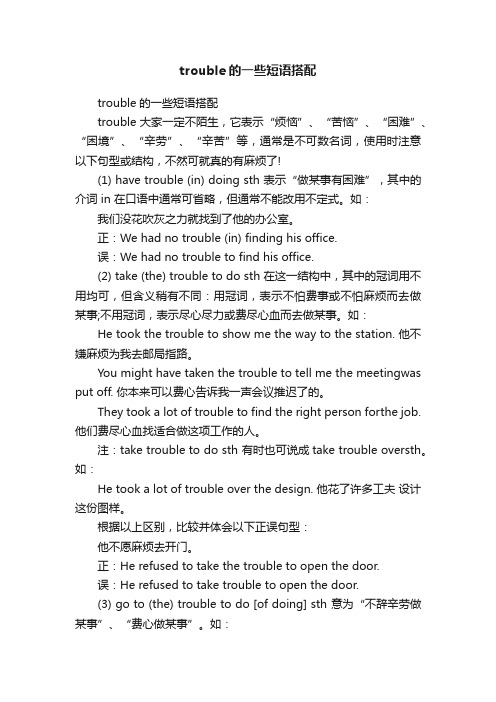
trouble的一些短语搭配trouble的一些短语搭配trouble大家一定不陌生,它表示“烦恼”、“苦恼”、“困难”、“困境”、“辛劳”、“辛苦”等,通常是不可数名词,使用时注意以下句型或结构,不然可就真的有麻烦了!(1) have trouble (in) doing sth 表示“做某事有困难”,其中的介词 in 在口语中通常可省略,但通常不能改用不定式。
如:我们没花吹灰之力就找到了他的办公室。
正:We had no trouble (in) finding his office.误:We had no trouble to find his office.(2) take (the) trouble to do sth 在这一结构中,其中的冠词用不用均可,但含义稍有不同:用冠词,表示不怕费事或不怕麻烦而去做某事;不用冠词,表示尽心尽力或费尽心血而去做某事。
如:He took the trouble to show me the way to the station. 他不嫌麻烦为我去邮局指路。
You might have taken the trouble to tell me the meetingwas put off. 你本来可以费心告诉我一声会议推迟了的。
They took a lot of trouble to find the right person forthe job. 他们费尽心血找适合做这项工作的人。
注:take trouble to do sth 有时也可说成take trouble oversth。
如:He took a lot of trouble over the design. 他花了许多工夫设计这份图样。
根据以上区别,比较并体会以下正误句型:他不愿麻烦去开门。
正:He refused to take the trouble to open the door.误:He refused to take trouble to open the door.(3) go to (the) trouble to do [of doing] sth 意为“不辞辛劳做某事”、“费心做某事”。
trouble sb. to do sth造句
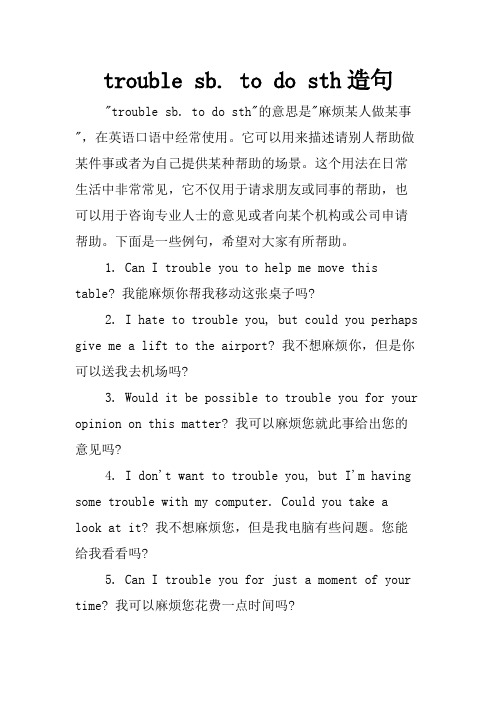
trouble sb. to do sth造句"trouble sb. to do sth"的意思是"麻烦某人做某事",在英语口语中经常使用。
它可以用来描述请别人帮助做某件事或者为自己提供某种帮助的场景。
这个用法在日常生活中非常常见,它不仅用于请求朋友或同事的帮助,也可以用于咨询专业人士的意见或者向某个机构或公司申请帮助。
下面是一些例句,希望对大家有所帮助。
1. Can I trouble you to help me move this table? 我能麻烦你帮我移动这张桌子吗?2. I hate to trouble you, but could you perhaps give me a lift to the airport? 我不想麻烦你,但是你可以送我去机场吗?3. Would it be possible to trouble you for your opinion on this matter? 我可以麻烦您就此事给出您的意见吗?4. I don't want to trouble you, but I'm having some trouble with my computer. Could you take alook at it? 我不想麻烦您,但是我电脑有些问题。
您能给我看看吗?5. Can I trouble you for just a moment of your time? 我可以麻烦您花费一点时间吗?6. I know it's a lot to ask, but could Itrouble you to lend me some money until payday? 我知道这很过分,但是您可以借我一些钱用到发薪日吗?7. I'm sorry to trouble you, but would you mind giving me a hand with these groceries? 我很抱歉麻烦您,但是您可以帮我拿这些东西吗?8. I don't want to trouble you too much, but could you recommend a good restaurant in this area? 我不想麻烦您太多,但是您可以推荐这个地区的一个好餐厅吗?9. Please don't trouble yourselves to come to the station, I can find my own way home. 请不要麻烦你们来车站送我,我自己可以回家。
- 1、下载文档前请自行甄别文档内容的完整性,平台不提供额外的编辑、内容补充、找答案等附加服务。
- 2、"仅部分预览"的文档,不可在线预览部分如存在完整性等问题,可反馈申请退款(可完整预览的文档不适用该条件!)。
- 3、如文档侵犯您的权益,请联系客服反馈,我们会尽快为您处理(人工客服工作时间:9:00-18:30)。
∙ 1. CT:行。
我现在我该走了。
给你添麻烦了吧: CT:All right. I must be off now. I hope
I haven’t inconvenienced you too much.
例句
∙ 1.我们出去度假时我给你添麻烦了吗?
Do I bother you when we go on vacations?
∙ 2.好的,谢谢。
对不起。
给你添麻烦了。
Okay. Thanks. Sorry to be a nuisance.
∙ 3.谢谢给你添麻烦了!
Thank you for you trouble.
Sorry for the inconvenience!
I'm sorry to bother you again! ... Sorry for troubling you again. 肯定对哦
sorry to trouble you.
I feel sorry for taking your time.
给某人添麻烦用give sb. trouble,trouble sb 的结构。
或者disturb sb都可以sorry for giving you a touble
对不起给你带来麻烦
I didn't like to disturb you.
本来不想给你添麻烦的
Tom最近工作中总是出错,惹得上司三天两头对他发火。
昨天他又弄丢了一份重要文件,上司扬言要开除他。
Catherine听说了这件事后,决定找上司说说情。
Tom拦住了她,说:Thank you very much, my friend. But I don't want to put you out.
【小编的小喇叭】
I don't want to put you out.我不想给你添麻烦。
这个习语乍一看,好像是说:“我不想让你出去。
”但这与其真实意义相去甚远。
这并不奇怪,因为俚语和习语的定义就是,那些表面意义和真实意义相去甚远的句子,或是从其中的一个
个单词根本无法看出整个句子真实意义的句子。
这里的put out意思是“使不方便,打扰”,例如:I'm sorry, I've put you out.这句话的意思就是“很抱歉给你们添麻烦了”。
【英语情景剧】
Jane: I see you are so tired. Y ou might as well stay with me tonight and set off tomorrow.
简:看得出你已经很累了,你今晚还是待在我这里吧,等明天再出发。
Shirley: Thank you very much. But I don't want to put you out.
雪莉:真是非常感谢啊,不过我不想给你添麻烦。
Դ: /kouyu/201009/113142.shtml。
